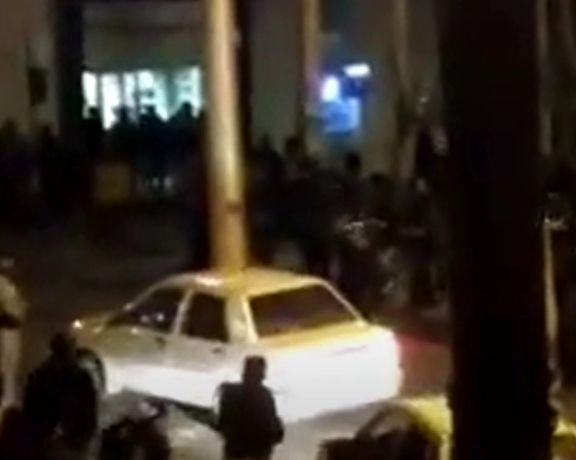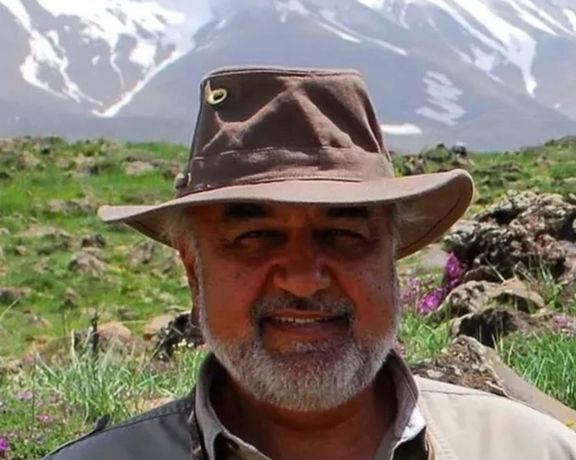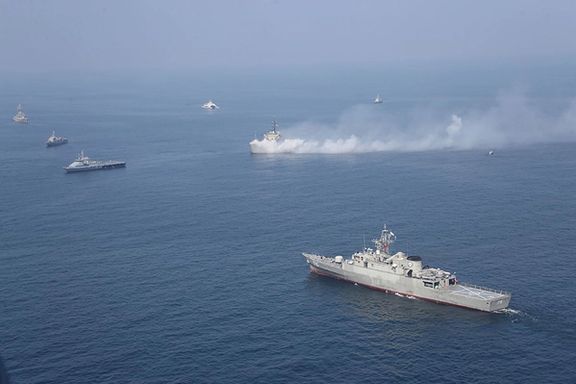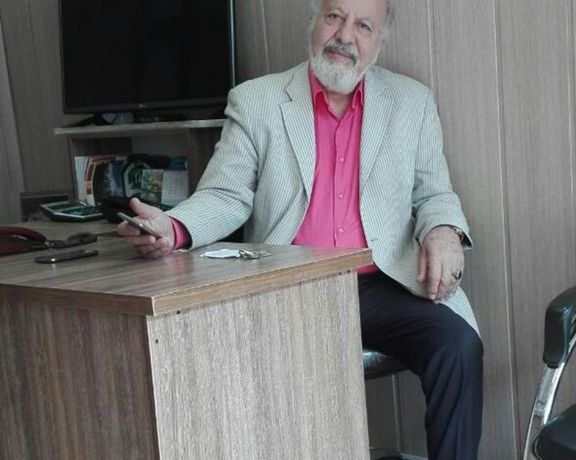Nowruz Brings Kurdish Unrest In Iran’s North West

Social media users reported security forces clashing with gatherings of people celebrating Noruz (Nowruz) in the mainly Kurdish city of Oshnavieh, in Iran.

Social media users reported security forces clashing with gatherings of people celebrating Noruz (Nowruz) in the mainly Kurdish city of Oshnavieh, in Iran.
Sunday evening, special forces attacked the people of Oshnavieh in northwest Iran to prevent the celebrations from taking place. Clashes broke out when people resisted, and security forces started beating them with batons and fired tear gas.
The situation was reported tense in many Kurdish cites as residents ignored warnings by the government against celebrating the ancient Iranian New Year according to Kurdish traditions with large get-togethers involving traditional dance and music.
The Kurdish political parties, which support autonomy, are based in neighboring northern Iraq, where there has been a self-governing Kurdish entity since 1991.
For over two and half millennia, long before the advent of Islam in the 7th century, Noruz (Nowruz), which falls on spring equinox, has been marked across central Asia as far as China. Noruz literally translates as 'New Day’ but has long taken on a political significance for Kurds in Turkey, Iran, Syria and Iraq.
Iran’s oldest Kurdish party, the Kurdish Democratic Party of Iran (KDPI), supports a self-governing Kurdish entity within a federal state. Two of its leaders – Abdolraham Ghassemlou and Sadegh Sharafkandi – were murdered in Europe in 1989 and 1991, possibly on orders from Tehran.

An Iranian-American environmentalist who has been imprisoned by Iran has now been moved to a residential location, Britain's Foreign Office said on Monday.
Morad Tahbaz, who also holds British citizenship and whose family say he was born in Britain, had been taken back to prison on Friday after being released on furlough on Wednesday. His sister made a plea for his release after two dual nationals were allowed to leave Iran.
The United Kingdom paid a $530 million old debt to Iran before two dual nationals were released last week and Tahbaz was also supposed to go on furlough according to the deal. He was jailed in 2018 and sentenced to 10 years on trumped-up charges of espionage, like many other dual-nationals and foreigners imprisoned by Iran.
Britain's foreign ministry said on Friday it had been told by Iran that Tahbaz, 66, had been taken back to Evin prison in order to fit an ankle bracelet and that the British government hoped he would be allowed out in coming hours.
"Morad has now been moved from Evin prison to a residential location in Tehran," a Foreign Office spokesperson said in a statement on Monday.
"We ... continue to lobby the Iranian authorities at the highest levels to allow him to return home immediately, as the Iranian government committed to doing."

US National Security Advisor Jake Sullivan has accused Iran of enabling Yemen’s Houthis to launch missile and drone attacks against Saudi Arabia.
Reacting to multiple attacks over the weekend, Sullivan issued a statement condemning the aggression against Saudi civilian infrastructure, including oil and gas, as well as water treatment facilities.
Notably, the national security advisor also pointed his finger at Iran for “enabling” the Houthis to launch such attacks.
“The Houthis launch these terrorist attacks with enabling by Iran, which supplies them with missile and UAV components, training, and expertise,” the statement read. He noted that this violates UN Security Council resolutions “prohibiting the import of weapons into Yemen.”
Sullivan’s statement came amid news reports that Washington is contemplating to remove Iran’s Revolutionary Guard (IRGC) designation as a Foreign Terrorist Organization (FTO). The Guards with their extraterritorial Qods (Quds) Force are in charge of arming and guiding Tehran’s militant affiliates and proxies in the Middle East and beyond.

After almost a year of talks between Iran and the West in Vienna to revive the Obama-era nuclear deal known as JCPOA, it appears that the last hurdle is Tehran’s demand to have the IRGC sanctions removed. The US is reportedly seeking a guarantee that Iran would curtail the activities of its military-intelligence force in the region.
Many are skeptical about the value of any assurances by Tehran when the Islamic Republic’s core values are based on spreading its Shiite influence in the region.
Israel has voiced strong public opposition in recent days to IRGC’s ‘delisting’ as a step that would create more instability in the region. Persian Gulf Arab states are believed to have sent the same message to Washington, albeit quietly.
The Biden administration removed the Houthis from its list of terrorist organization a year ago and it did not help peace efforts for Yemen. Sullivan in his statement drew attention to Houthi intransigence.
“Saudi Arabia and the Yemeni Government have endorsed multiple UN calls for ceasefires and de-escalation over the last year. The Houthis have rejected these calls, responding instead with new offensives in Yemen and terrorist acts,” the national security advisor said.
It is noteworthy that the State Department had not issued a statement on Houthi attacks at the time of this publication.
The Wall Street Journal reported on Monday that the United States has transferred “a significant number of Patriot antimissile interceptors” to Saudi Arabia after repeated appeals by Riyadh to replenish its arsenal. The missiles have been effective in destroying most Houthi projectiles and drones.
After Russia’s invasion of Ukraine, the Biden administration has been scrambling to have Arab states supply more oil to world markets, which apparently, they still hold back. Arab producers cling to OPEC+ agreements in capping oil exports and they have not broken from Russia in their cooperation to manage supplies and prices.
One reason is also their dismay at the US policy of signing a limited new nuclear deal with Iran, which they believe will not contain Tehran’s aggressive behavior in the region.
The transfer of Patriots could be an attempt to improve the administration’s relations with Riyadh, at the same time adopting a tougher position against Houthis and Iran’s military support for them.

The commander of IRGC's navy has issued new threats against “enemies” as Washington considers removing sanctions imposed on the controversial military force.
Media reports in recent days indicate the Biden administration is negotiating with Iran to remove the Revolutionary Guard from the Foreign Terrorist Organization (FTO) list in exchange for a promise by Iran to limit its malign activities in the region.
The IRGC's news website Sepah News on Sunday quoted Alireza Tangsiri the commander of IRGC's naval forces as having said at a gathering of officers that the Guards will deal with any threat from enemies by attacking the source of the threat.
Last week, IRGC targeted a building in Erbil claiming it was being used by Israeli agents who hatched plots against Iran. Tehran was subsequently criticized by Europe and the United States for lobbing ballistic missiles at civilian areas. Its ambassador in Baghdad was summoned to the Iraqi foreign ministry for explaining why his government violated Iraq’s security. However, IRGC's public relations officer later threatened that Iran will attack two more similar places in Iraq if alleged Israeli threats continue.

Tangsiri said that the IRGC is tasked with always monitoring the enemies’ behavior. He explained, "Our defense system is aggressive in nature, and we will destroy any threat at its source."
Repeating Iranian officials' statements, Tangsiri said that the enemies are plotting seditions against Iran all the time and are always ready to deal a blow. He added that as a result the IRGC needs to raise its combat readiness and military preparedness to defend the Islamic Republic.
He advised combat units and commanders of the IRGC naval force to assess all possible confrontations and monitor the enemies' moves. Tangsiri further boasted that the IRGC will use its submarines and under water equipment [probably alluding to mines], high speed gunboats and drones to secure its supremacy in the Persian Gulf, the Strait of Hormuz and the northern part of the Indian Ocean in a way to make the enemies sleepless.
In the past years, particularly in 2019, the IRGC threatened commercial navigation in those areas and at times attacked oil tankers and other ships near Oman and the United Arab Emirates.
Tangsiri reiterated that Iran has always declared that security in the Persian Gulf and the Strait of Hormuz is solely the responsibility of regional states and stressed that "foreigners" should leave the region at once. "Iran will never step back from its position about the security of the region and we will not compromise with anyone about this," he said, while threatening that the IRGC will destroy any plot to undermine this security. He added that solidarity among Muslim nations of the region can lead to their security.
Tangsiri's claims about not tolerating the presence of foreign forces in the region is contradictory to the presence of several US and European fleets in the Persian Gulf that contribute to security at the request of the regional counties who are concerned about Tehran's ambitions and provocations.
During the past years, international players such as European countries and the United States as well as several regional countries have stated that Iran's policies and action, including attacks on civilian shipping and helping proxy groups in Yemen and elsewhere to attack oil installations is the main factor contributing to instability.

Israeli Prime Minister Naftali Bennett congratulated the Iranian New Year Noruz through a video message sent to Iran International wishing peace and prosperity.
Bennett praised the centuries-old friendship between Jews and Iranians and expressed hope that in a near future the two people “can restore that relationship,” and added that “We seek peace, and we hope, we wish that the Iranian people will have prosperity.”
Bennett went on to say that Israel knows the vast majority of Iranians oppose the policies of “the ayatollah regime”, which spends money on “missiles, terror” rather than on their children and on education.
“I hope that in a short period of time, inshallah (God willing) we will have peace,” Bennett said and concluded his message with words in Persian marking Noruz (Nowruz).

Shokrollah Jebeli an 82-year-old Iranian-Australian who was being held in Iran’s Evin prison died after being denied medical care for his multiple illnesses.
His son tweeted on Sunday that Jebeli has passed away. The family of the 82-year-old dual citizen and right groups had repeatedly expressed concerns about his health.
On March 14, Amnesty International issued a statement urging his immediate release because of his age and poor health, as well as violations of his fair trial rights rendering his detention arbitrary.
Amnesty said Iranian authorities were torturing him “by deliberately denying him adequate specialized medical care and withholding medication for his multiple serious health conditions”.
The statement said he was suffering from enlarged kidney stones, a history of strokes, sciatica in the legs, high blood pressure and an umbilical hernia that required surgery, but prison authorities refused to provide him with the adequate specialized medical care.
According to the statement, Jebeli was facing two separate cases in relation to financial dispute claims. He was sentenced to four years and six months in prison in one case, and the second was ongoing while he was denied legal representation of his choosing and was held in jail for 17 months without trial.
Iranian authorities deny medical care as a means of pressure on detainees. There have been numerous cases of withholding medical treatment for political prisoners. In January, jailed poet Baktash Abtin who suffered from Covid-19 died in custody after being denied timely hospitalization.
Tweet unavailable